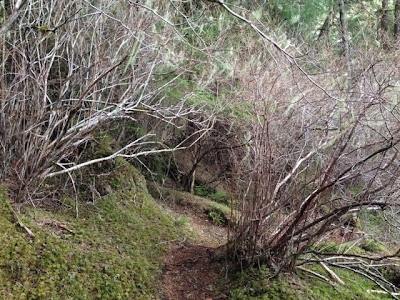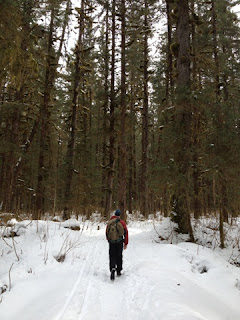A Sunday Walk Through The Woods
With
Scott away in Sitka for the sac roe herring fishery, I spent this weekend solo.
This translated into dance class Friday night followed by a couple hours
hanging out at the apartment of a fellow dancer, work at the Capitol Saturday
afternoon, then dinner at Zen Saturday night with the Capitol press corps (for
one night, at least, I got to pretend I was part of the group), followed by the
infamous Legislative Skits.
Every
year, a group of staffers puts on a multi-act show depicting the inner workings
of the Alaska legislature which often includes crude, uncomfortable, and
sometimes funny impersonations of their bosses. I wasn’t sure if I wanted to be
a witness to all the roasting but as I’ve become a Capitol junkie, I figured Leg
Skits could feed my addiction from a different angle.
While I’m happy I attended the event, some of the skits left a sour taste in my mouth. I found myself laughing at songs and jokes that were wittily created but too terrifyingly true to not make one feel guilty for finding any type of joy in the subject matter (for example, a song begging cruise ship passenger to “think of us before you poo poo” to the tune of Wham’s 1984 hit single, which makes light of the fact that Alaskan legislators overturned a citizen’s initiative - i.e. stabbed the public in the back - to enforce strict regulations on how the cruise ship industry deals with dumping waste water). My laughter would awkwardly trail off and I’d end up feeling just sad at what Alaska may become. The group of actors made repeated harsh jabs at their very own bosses (or their boss’s decisions), who they supposedly respect. I’m probably just taking things too seriously – I’ve been known to do that – but as someone who has slowly over the past three months grown to care about what’s going in the state of Alaska as a whole, I guess I took offense to some of the skits.
The actors portrayed what I presume is a usual cast of stereotypes within any state legislature – the drunk, the womanizer, the feminist, the liberal idealist, the ultra-conservative, the freshman, the war veteran, the Asian. To make fun of Alaska’s lone Asian legislator – a young House member who’s half Japanese – the actors decided to don totally antiquated “Asian” accents. While some of the skits were intelligently written and well-acted, the portrayal of Representative Kawasaki was neither of those things.
Whenever a member of the House or Senate was being made fun of, it was natural to want to see that person’s reaction. But there were around fifty tables in Centennial Hall for the show and from the press table I was only able to view a small portion of the total number of legislators who were in attendance. I tried to look at the House Majority Leader as he was being criticized for being dull, or at the Wrangell Representative when she was being called indecisive, or at a long standing legislator when he was being made fun of for just about everything. But I guess, for a politician, being parodied is better than being ignored.
After the skits, I had my second experience of being “out on the town” in Juneau since Scott and I moved here. Along with a few reporters, I went to the Imperial Bar for the first time and tried my hardest to rub elbows with Capitol folks I see all the time but never get the chance to talk to. I lasted for about an hour, which I thought was good for me, before I made the long drive back to North Douglas.
In order to cleanse myself from any residual guilt or sleaziness I felt from the previous night, I drove out to the end of North Douglas this afternoon and went for a walk through the woods. What’s amazing about this particular piece of forest is that one can walk a nice, long distance in the woods and parallel the ocean the entire time, hear the tide slowly lapping in, smell the sea mixture of mussels and seaweed and barnacles, and look out from time to time over the wondrous expanse of water. Scott and I have walked in these woods a few times now, but today was the first time that snow was completely absent. The ground was spongy and the bottoms of all the trunks were covered with fresh green growth. Walking today, I felt so lucky.
While I’m happy I attended the event, some of the skits left a sour taste in my mouth. I found myself laughing at songs and jokes that were wittily created but too terrifyingly true to not make one feel guilty for finding any type of joy in the subject matter (for example, a song begging cruise ship passenger to “think of us before you poo poo” to the tune of Wham’s 1984 hit single, which makes light of the fact that Alaskan legislators overturned a citizen’s initiative - i.e. stabbed the public in the back - to enforce strict regulations on how the cruise ship industry deals with dumping waste water). My laughter would awkwardly trail off and I’d end up feeling just sad at what Alaska may become. The group of actors made repeated harsh jabs at their very own bosses (or their boss’s decisions), who they supposedly respect. I’m probably just taking things too seriously – I’ve been known to do that – but as someone who has slowly over the past three months grown to care about what’s going in the state of Alaska as a whole, I guess I took offense to some of the skits.
The actors portrayed what I presume is a usual cast of stereotypes within any state legislature – the drunk, the womanizer, the feminist, the liberal idealist, the ultra-conservative, the freshman, the war veteran, the Asian. To make fun of Alaska’s lone Asian legislator – a young House member who’s half Japanese – the actors decided to don totally antiquated “Asian” accents. While some of the skits were intelligently written and well-acted, the portrayal of Representative Kawasaki was neither of those things.
Whenever a member of the House or Senate was being made fun of, it was natural to want to see that person’s reaction. But there were around fifty tables in Centennial Hall for the show and from the press table I was only able to view a small portion of the total number of legislators who were in attendance. I tried to look at the House Majority Leader as he was being criticized for being dull, or at the Wrangell Representative when she was being called indecisive, or at a long standing legislator when he was being made fun of for just about everything. But I guess, for a politician, being parodied is better than being ignored.
After the skits, I had my second experience of being “out on the town” in Juneau since Scott and I moved here. Along with a few reporters, I went to the Imperial Bar for the first time and tried my hardest to rub elbows with Capitol folks I see all the time but never get the chance to talk to. I lasted for about an hour, which I thought was good for me, before I made the long drive back to North Douglas.
In order to cleanse myself from any residual guilt or sleaziness I felt from the previous night, I drove out to the end of North Douglas this afternoon and went for a walk through the woods. What’s amazing about this particular piece of forest is that one can walk a nice, long distance in the woods and parallel the ocean the entire time, hear the tide slowly lapping in, smell the sea mixture of mussels and seaweed and barnacles, and look out from time to time over the wondrous expanse of water. Scott and I have walked in these woods a few times now, but today was the first time that snow was completely absent. The ground was spongy and the bottoms of all the trunks were covered with fresh green growth. Walking today, I felt so lucky.


























